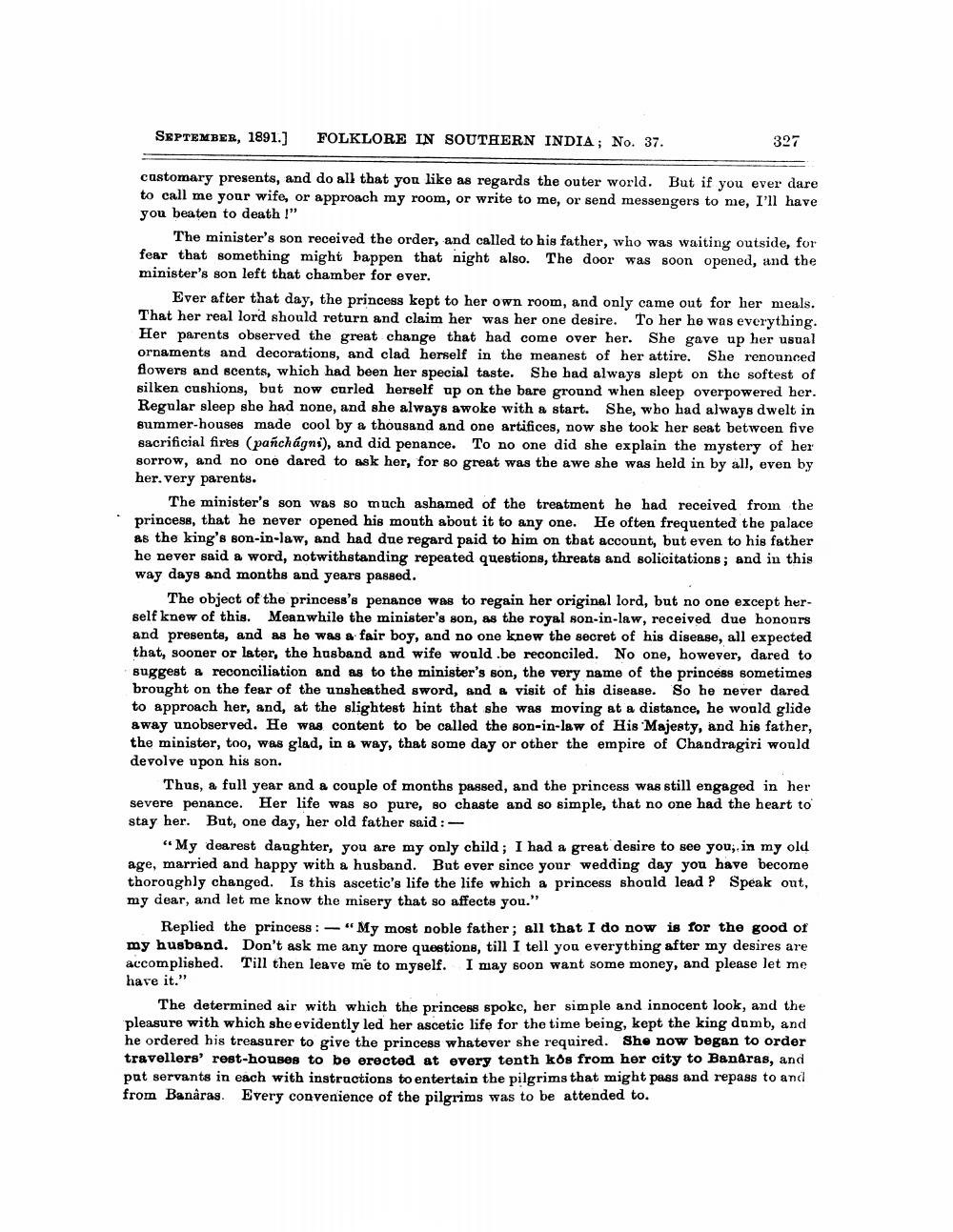________________
SEPTEMBER, 1891.]
customary presents, and do all that you like as regards the outer world. But if you ever dare to call me your wife, or approach my room, or write to me, or send messengers to me, I'll have you beaten to death !"
FOLKLORE IN SOUTHERN INDIA; No. 37.
327
The minister's son received the order, and called to his father, who was waiting outside, for fear that something might happen that night also. The door was soon opened, and the minister's son left that chamber for ever.
Ever after that day, the princess kept to her own room, and only came out for her meals. That her real lord should return and claim her was her one desire. To her he was everything. Her parents observed the great change that had come over her. She gave up her usual ornaments and decorations, and clad herself in the meanest of her attire. She renounced flowers and scents, which had been her special taste. She had always slept on the softest of silken cushions, but now curled herself up on the bare ground when sleep overpowered her. Regular sleep she had none, and she always awoke with a start. She, who had always dwelt in summer-houses made cool by a thousand and one artifices, now she took her seat between five sacrificial fires (pañchágni), and did penance. To no one did she explain the mystery of her sorrow, and no one dared to ask her, for so great was the awe she was held in by all, even by her. very parents.
The minister's son was so much ashamed of the treatment he had received from the princess, that he never opened his mouth about it to any one. He often frequented the palace as the king's son-in-law, and had due regard paid to him on that account, but even to his father he never said a word, notwithstanding repeated questions, threats and solicitations; and in this way days and months and years passed.
The object of the princess's penance was to regain her original lord, but no one except herself knew of this. Meanwhile the minister's son, as the royal son-in-law, received due honours and presents, and as he was a fair boy, and no one knew the secret of his disease, all expected that, sooner or later, the husband and wife would be reconciled. No one, however, dared to suggest a reconciliation and as to the minister's son, the very name of the princess sometimes brought on the fear of the unsheathed sword, and a visit of his disease. So he never dared to approach her, and, at the slightest hint that she was moving at a distance, he would glide away unobserved. He was content to be called the son-in-law of His Majesty, and his father, the minister, too, was glad, in a way, that some day or other the empire of Chandragiri would devolve upon his son.
Thus, a full year and a couple of months passed, and the princess was still engaged in her severe penance. Her life was so pure, so chaste and so simple, that no one had the heart to stay her. But, one day, her old father said: -
"My dearest daughter, you are my only child; I had a great desire to see you, in my old age, married and happy with a husband. But ever since your wedding day you have become thoroughly changed. Is this ascetic's life the life which a princess should lead? Speak out, my dear, and let me know the misery that so affects you."
Replied the princess: "My most noble father; all that I do now is for the good of my husband. Don't ask me any more questions, till I tell you everything after my desires are accomplished. Till then leave me to myself. I may soon want some money, and please let me have it."
The determined air with which the princess spoke, her simple and innocent look, and the pleasure with which she evidently led her ascetic life for the time being, kept the king dumb, and he ordered his treasurer to give the princess whatever she required. She now began to order travellers' rest-houses to be erected at every tenth kos from her city to Banaras, and pat servants in each with instructions to entertain the pilgrims that might pass and repass to and from Banaras. Every convenience of the pilgrims was to be attended to.




